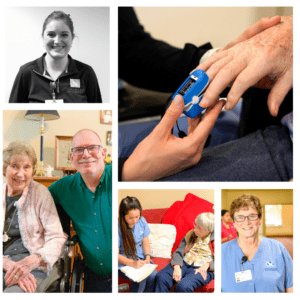Helping a loved one with Alzheimer’s Disease (AD) can be very difficult. This is especially true for patients with late-stage AD. Late-stage AD is a time where a patient has lost most of their memories and speech, making caring for them hard and communicating with them harder.
There are a few things families can do to make the process of taking care of a loved one with AD easier.
Discussing Alzheimer’s with Your Family
The progression of AD leads to a patient being unable to speak and total memory loss (among other things). This can make it difficult for families to agree on what their loved one would want to do or prefer in a given situation. Situations like ‘dad wouldn’t want to live in a home’ or ‘who will change the safety features of mom’s house’ can be difficult to deal with when a person can’t speak for themselves.
This is why communication is the key to successfully navigating some of the challenges associated with AD.
Talking to the person with AD after they have been diagnosed with AD can be the easiest way to come to specific decisions. If a person with AD still has good cognitive function and memory retention, speak to them about potential issues as soon as possible.
Speaking to other family members and caregivers is also important. Making sure everyone is on the same page can lead to care consistent with a person or family’s wishes.
Avoiding Alzheimer’s-Related Burnout
Burnout is a very real struggle that families and caregivers of people with AD have to deal with. Late-stage AD oftentimes manifests itself with increased aggression and memory loss, making dealing with a loved one very difficult.
If you are the primary caregiver of a loved one with AD you need to avoid burning yourself out. Taking care of someone 24/7 can be very taxing–and may eventually take a toll in the form of you lashing out or forgetting a duty.
Make sure to take breaks. If there is no one else in your circle of family or friends who is able to help, think about having a healthcare professional step in for a few shifts. The cost of a full-time caregiver can be prohibitive (even with insurance), but maintaining a caregiver for a few days a month may be reasonable.
If you or another family member/caregiver is having a very difficult time taking care of a loved one with AD, it may be a good idea to talk to someone. If a certain situation regarding AD is troubling you, seek a healthcare professional or doctor to give you some advice. If an emotional issue is becoming too much, make sure to schedule time with a therapist or counselor.
Making sure you are in good health (both mental & physical) is the only way to make sure your loved one is cared for properly.
Charlin Health Services
At Charlin Health Services we pride ourselves on honor, integrity, excellence, compassion, dignity, and trust. If you have any needs or questions about health services, hospice care, or other medical needs, please send us an email or give us a call.
About Our Alzheimer’s Expert
Emilynn Bryce BSN, RN is the hospice director of nursing at Charlin Healthcare Services. Emilynn received a BS in registered nursing from St. Louis University. After graduating, Emilynn worked as a registered nurse at St. Luke’s Hospital in Chesterfield, MO. Emilynn has been with Charlin since 2018.
Listen to the full Charlin Alzheimer’s podcast here.



